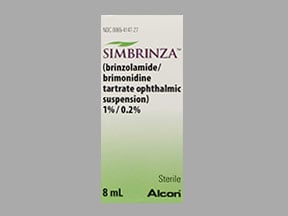
Simbrinza Coupons & Savings Card – Discount Prices from $203.38
My prescription
Edit
8ML of 1-0.2%, Simbrinza (1 Bottle)
Select pharmacy

CVS
$215.29
COUPON PRICE
Walmart
$203.38
COUPON PRICE
Walgreens
$204.37
COUPON PRICE
Albertsons
$222.38
COUPON PRICESimbrinza savings card
Show this card to your pharmacist
Walmart
$203.38
BIN
ID
PCN
GRP
019876
LHFCBD79E5
CHIPPO
LHX
Powered by
More prescriptions for glaucoma
More prescriptions for glaucoma
Price history for Simbrinza
1 Bottle, 8ML of 1-0.2%
Average retail price for Simbrinza
Average SaveHealth price for Simbrinza
Our price history data is based on aggregated prescription data collected from participating pharmacies in America. Our prescription data updates daily to reflect the latest price changes. If you notice a missing data point, it means there wasn't sufficient data available to generate a monetary value for that date.
*Retail prices are based on pharmacy claims data, and may not be accurate when we don't have enough claims.
Simbrinza dosage forms
Dosage Quantity Price from Per unit 8ML of 1-0.2% 1 Bottle $203.38 $203.38 8ML of 1-0.2% 2 Bottles $406.76 $203.38 8ML of 1-0.2% 3 Bottles $610.14 $203.38
| Dosage | Quantity | Price from | Per unit |
|---|---|---|---|
| 8ML of 1-0.2% | 1 Bottle | $203.38 | $203.38 |
| 8ML of 1-0.2% | 2 Bottles | $406.76 | $203.38 |
| 8ML of 1-0.2% | 3 Bottles | $610.14 | $203.38 |
Simbrinza Warnings
The following safety information provides essential guidance regarding the use of Simbrinza (brinzolamide / brimonidine) eye drops. Please read carefully and discuss any questions with your healthcare provider.
Usage Instructions: Simbrinza should only be applied to the surface of the eye. Do not ingest or inject this medication.
Allergic Reactions: If you are allergic to sulfa medications such as Bactrim (sulfamethoxazole / trimethoprim), consult your healthcare provider before using Simbrinza, as it contains brinzolamide, a sulfa medication, which may cause severe allergic reactions.
Corneal Swelling Risk: Individuals with a thin cornea or a reduced number of corneal cells should seek advice from an eye specialist before using Simbrinza, as it may increase the risk of corneal edema.
Blood Flow Concerns: Simbrinza contains brimonidine, which could potentially exacerbate conditions related to poor blood flow, such as depression, Raynaud's phenomenon, orthostatic hypotension, and serious heart problems. Disclose your full medical history to your prescriber to ensure appropriate monitoring.
Infection Prevention: To avoid contamination and subsequent eye infections, wash your hands before application and avoid contact between the dropper tip and any surfaces, including your eye.
Contact Lens Instructions: Remove soft contact lenses prior to using Simbrinza due to the preservative benzalkonium chloride, which can damage lenses. Wait at least 15 minutes after applying the drops before reinserting lenses.
Contraindications:
- Do not use Simbrinza if you are under 2 years of age or have known allergies to brinzolamide or brimonidine. Always consult your healthcare provider if these conditions apply to you.
Simbrinza Side Effects
When using this medication, some people may experience mild side effects that are generally not a cause for concern. These include blurry vision, eye discomfort such as itching or irritation, a dry sensation in the eyes or mouth, changes in taste like a bitter or sour flavor, dizziness, drowsiness, tiredness, and headaches. Although these effects are usually temporary, it is advisable to consult a healthcare provider if they persist or worsen. There are also other side effects that, while not common, have been reported. These include a burning or stinging sensation in the eyes, eye redness, and tiredness. If these side effects occur, especially if they become severe, seeking medical advice is recommended to ensure that they are managed appropriately. In rare cases, serious side effects can occur and necessitate immediate medical attention. These include fast or irregular heartbeats, eye or eyelid pain, burning, swelling, extreme sensitivity to light, vision changes, fainting, and difficulty breathing. A very serious allergic reaction is uncommon but can manifest as a rash, swelling (particularly of the face, tongue, or throat), severe dizziness, or trouble breathing. If any symptoms of a serious allergic reaction appear, seek emergency medical assistance promptly.
Simbrinza Interactions
What is Simbrinza used for?
Simbrinza is used to lower elevated intraocular pressure in patients with open-angle glaucoma or ocular hypertension.
What is the generic drug for Simbrinza?
The generic drugs for Simbrinza are brinzolamide and brimonidine tartrate.
Why is Simbrinza so expensive?
Simbrinza can be expensive due to several factors, including the costs associated with research and development, manufacturing, and distribution. Additionally, it is a combination medication used for specific eye conditions, which can contribute to its pricing. The lack of generic alternatives and the costs of regulatory compliance may also play a role in its price. Patients are encouraged to discuss with their healthcare provider or pharmacist about potential cost-saving options, such as patient assistance programs or generic alternatives if available.
What is a substitute for Simbrinza?
A substitute for Simbrinza, which is used to lower intraocular pressure in patients with glaucoma or ocular hypertension, could be other medications that serve a similar purpose. These may include other combination eye drops or individual medications such as beta-blockers (e.g., Timolol), prostaglandin analogs (e.g., Latanoprost), or carbonic anhydrase inhibitors (e.g., Dorzolamide). It is important for the patient to consult with an ophthalmologist to determine the most appropriate alternative based on their specific condition and medical history.
When will Simbrinza become generic?
As of the latest available information, there is no specific date announced for when Simbrinza will become available as a generic medication. The availability of a generic version depends on patent expirations and regulatory approvals. It is advisable to check with a healthcare provider or a pharmacist for the most current information regarding the availability of generic Simbrinza.
